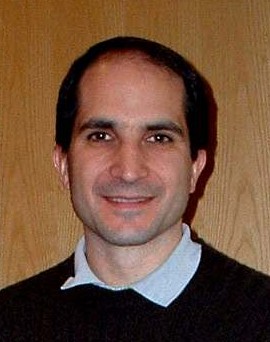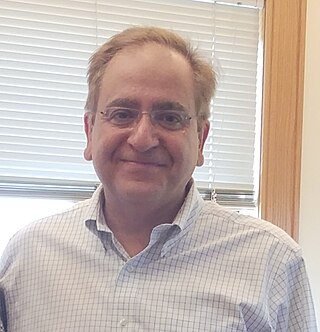Related Research Articles
The Dirac Medal or Dirac prize can refer to different awards named in honour of the physics Nobel Laureate Paul Dirac.

The Institute for Theoretical and Experimental Physics is a multi-disciplinary research center located in Moscow, Russia. ITEP carries out research in the fields of theoretical and mathematical physics, astrophysics, high energy particle physics, nuclear physics, plasma physics, solid state physics, nanotechnology, reactor and accelerator physics, medical physics, and computer science. ITEP also maintains an extensive educational program and organizes physics schools for scholars and undergraduates. The institute is located near the corner of the Sevastopol prospect and the Nachimowski prospect and occupies part of the former estate "Cheryomushki-Znamenskoye" – an 18th-century manor that is a monument of architecture and landscape art of the 18th–19th centuries.

Juan Martín Maldacena is an Argentine theoretical physicist and the Carl P. Feinberg Professor in the School of Natural Sciences at the Institute for Advanced Study, Princeton. He has made significant contributions to the foundations of string theory and quantum gravity. His most famous discovery is the AdS/CFT correspondence, a realization of the holographic principle in string theory.

Cumrun Vafa is an Iranian-American theoretical physicist and the Hollis Professor of Mathematics and Natural Philosophy at Harvard University.

Alexander Markovich Polyakov is a Russian theoretical physicist, formerly at the Landau Institute in Moscow and, since 1989, at Princeton University, where he is the Joseph Henry Professor of Physics Emeritus.

Saul Arno Teukolsky is a theoretical astrophysicist and a professor of Physics and Astronomy at Caltech and Cornell University. His major research interests include general relativity, relativistic astrophysics, and computational astrophysics.
Bruno Zumino was an Italian theoretical physicist and faculty member at the University of California, Berkeley. He obtained his DSc degree from the University of Rome in 1945.

Joel Louis Lebowitz is a mathematical physicist widely acknowledged for his outstanding contributions to statistical physics, statistical mechanics and many other fields of Mathematics and Physics.

Iosif Benzionovich Khriplovich is a Russian theoretical physicist who has made deep contributions in quantum field theory, atomic physics, and general relativity.
Daniel Zissel Freedman is an American theoretical physicist. He is an Emeritus Professor of Physics and Applied Mathematics at the Massachusetts Institute of Technology (MIT), and is currently a visiting professor at Stanford University. He is mainly known for his work in supergravity. He is a member of the U. S. National Academy of Sciences.
Sergio Ferrara is an Italian physicist working on theoretical physics of elementary particles and mathematical physics. He is renowned for the discovery of theories introducing supersymmetry as a symmetry of elementary particles and of supergravity, the first significant extension of Einstein's general relativity, based on the principle of "local supersymmetry". He is an emeritus staff member at CERN and a professor emeritus at the University of California, Los Angeles.
Pierre Ramond is distinguished professor of physics at University of Florida in Gainesville, Florida. He initiated the development of superstring theory.
The Pomeranchuk Prize is an international award for theoretical physics, awarded annually since 1998 by the Institute for Theoretical and Experimental Physics (ITEP) from Moscow. It is named after Russian physicist Isaak Yakovlevich Pomeranchuk, who together with Landau established the Theoretical Physics Department of the Institute.

Mikhail "Misha" Arkadyevich Shifman is a theoretical physicist, formerly at the Institute for Theoretical and Experimental Physics, Moscow, currently Ida Cohen Fine Professor of Theoretical Physics, William I. Fine Theoretical Physics Institute, University of Minnesota.

Gregory W. Moore is an American theoretical physicist who specializes in mathematical physics and string theory. Moore is a professor in the Physics and Astronomy Department of Rutgers University and a member of the University's High Energy Theory group.
Arkady Vainshtein is a Russian and American Professor Emeritus of Theoretical physics who was awarded Pomeranchuk Prize (2005) and Sakurai Prize (1999) for theoretical physics.
Mikhail "Misha" Voloshin was a Russian and American theoretical physicist. Voloshin graduated from physics class of Moscow School 57 in 1970. Voloshin started working at ITEP in 1976 and accordingly earned his Ph.D. in 1977. In 1983 he received a Soviet medal and an award in physics. Beginning in 1990, he taught quantum physics at the William I Fine Theoretical Physics Institute, a division of the University of Minnesota College of Science and Engineering. In 1997 elected a fellow of the American Physical Society. In 2001 he was awarded J.J. Sakurai Prize for Theoretical Particle Physics and in 2004 he was awarded the Alexander-von-Humboldt Award.
Boris Ionovich Shklovskii is a theoretical physicist, at the William I Fine Theoretical Physics Institute, University of Minnesota, specializing in condensed matter. Shklovskii earned his A.B. degree in Physics, in 1966 and a Ph.D. in condensed matter theory, in 1968 from Leningrad University.
Andrey V. Chubukov is a theoretical physicist, at the William I Fine Theoretical Physics Institute, University of Minnesota, specializing in condensed matter. His speciality is physics of strongly correlated electron systems. Chubukov earned his M.Sci. degree in theoretical physics in 1982 and a Ph.D. in 1985 from Moscow State University.
The SLAC Theory Group is the hub of theoretical particle physics research at the SLAC National Accelerator Laboratory at Stanford University. It is a subdivision of the Elementary Particle Physics (EPP) Division at SLAC.
References
- ↑ UMN, CSE Inventing Tomorrow, Spring/Summer 2008, Vol. 32, 2., P.32-33
- ↑ Symmetry Magazine, August 2007
- ↑ William I. Fine Theoretical Physics Institute People
- ↑ William I. Fine Theoretical Physics Institute People OSC
- ↑ Physics Today, February 1991
- ↑ "William I. Fine Theoretical Physics Institute | College of Science and Engineering". 11 July 2024.
- ↑ Carnegie Corporation of New York
- ↑ National Academy of Sciences)
- ↑ William I. Fine Theoretical Physics Institute Misel
- ↑ Winners of the RAS awards, medals and prizes
- ↑ UMN, CSE Inventing Tomorrow, Spring/Summer 2008, Vol. 32, 2., P.32-33
- ↑ William I. Fine Theoretical Physics Institute Workshops
- ↑ CERN Courier, 2013
- ↑ CERN Courier, 2001
- ↑ UMN Distinguished McKnight University Professor
- ↑ APS Prizes and Awards
- ↑ About FTPI
- ↑ UMN School of Physics and Astronomy Faculty Awards
- ↑ 2019 Oliver E. Buckley Condensed Matter Prize
- ↑ Dirac Medallists 2016
- ↑ University of Illinois at Urbana-Champaign, Honors and Awards, Bardeen Prize
- ↑ APS Sakurai Prize
- ↑ ITEP Pomeranchuk Prize
- ↑ APS Lilienfeld Prize
- ↑ UMN Physics Awards
- ↑ Duke Physics Fritz London Memorial Prize
- ↑ APS Physics
- ↑ APS Lars Onsager Prize
- ↑ Bardeen Prize
- ↑ Physics Today February 1987
- ↑ Mpls-St. Paul Magazine 1999
- ↑ DOE Grant Funding